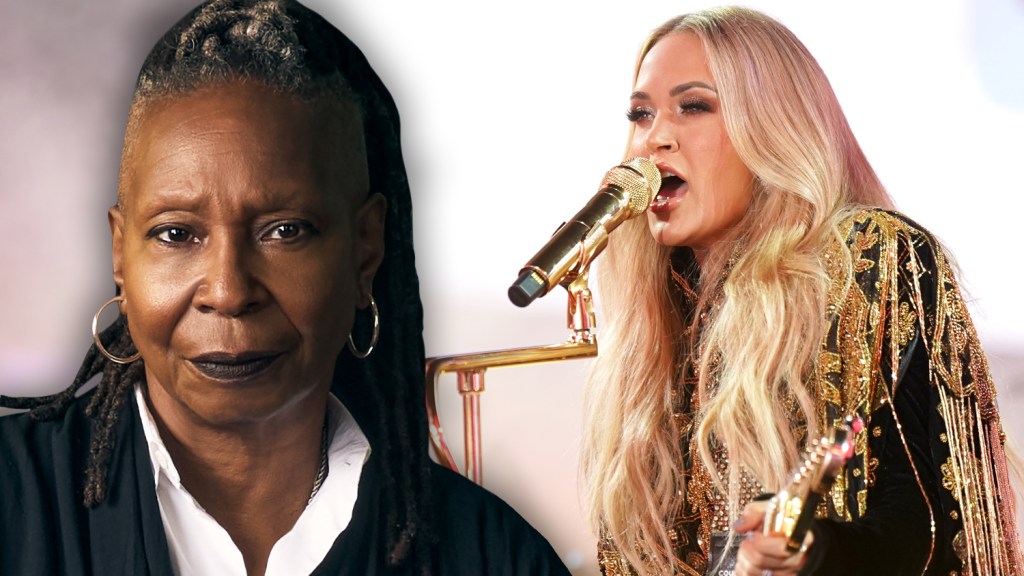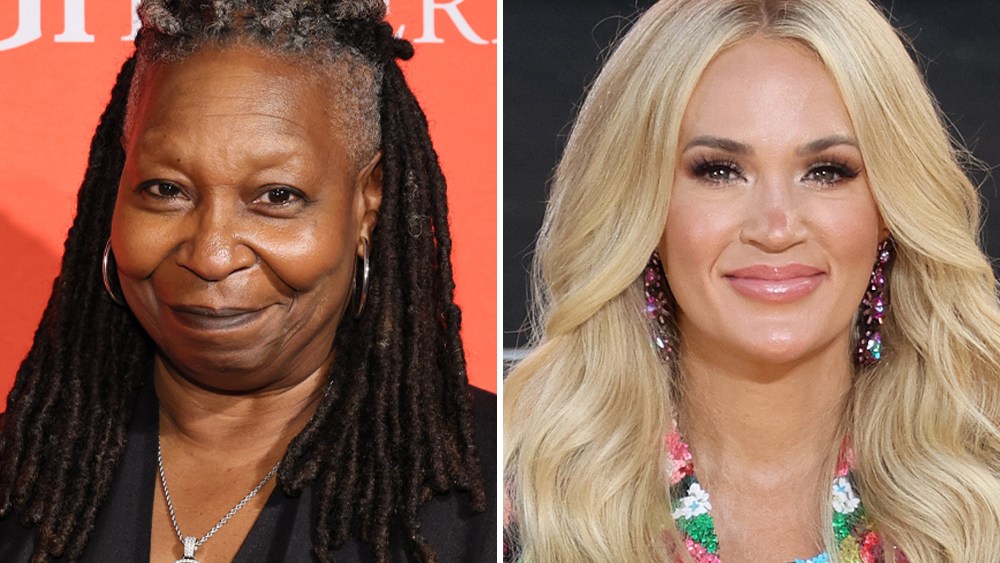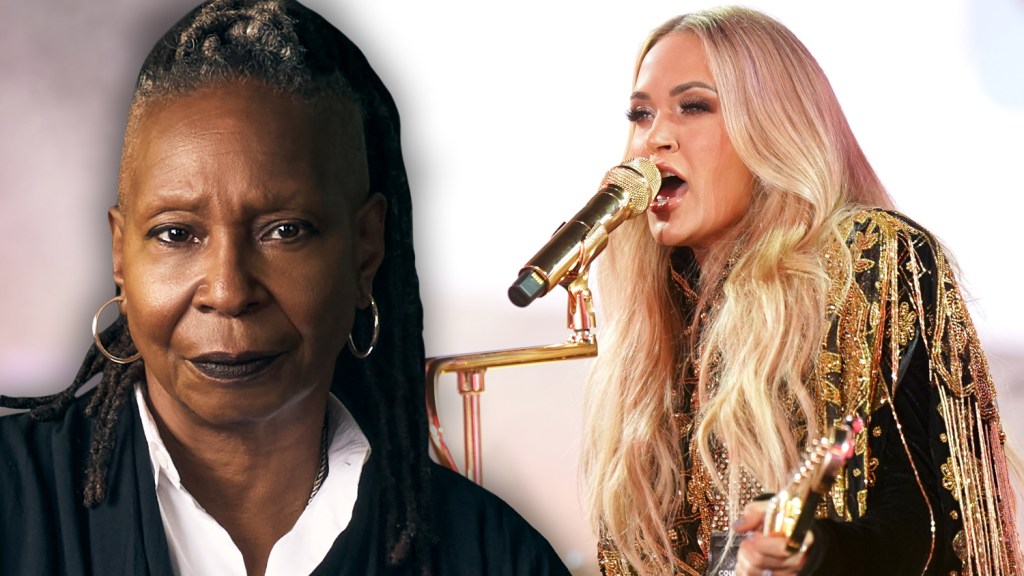## Whoopi’s Got Mixed Feelings: Supporting Carrie, Skipping the Trump Show
The 2024 Presidential Inauguration is just around the corner, and the guest list is already sparking controversy. Among the names making headlines: country music superstar Carrie Underwood, who’s confirmed to perform. But her decision has ignited a firestorm, with some praising her talent and others condemning her choice to lend her voice to the event.

Goldberg’s Support: A Balancing Act of Free Speech and Disapproval
Whoopi’s Stance: Defending Underwood’s Right to Perform

On “The View,” moderator Whoopi Goldberg championed Carrie Underwood’s decision to perform “America the Beautiful” at Donald Trump’s inauguration, emphasizing the importance of individual choice and artistic freedom. “I stand behind her,” Goldberg stated, “If I believe I have the right to make up my mind to go perform someplace, I believe [she has] the same right.” Goldberg’s stance echoed a broader sentiment within the media landscape, where many commentators stressed the importance of respecting artists’ decisions to perform, regardless of personal political affiliations.
Goldberg went on to draw parallels to other public figures who have made controversial choices, citing the meeting between MSNBC hosts Joe Scarborough and Mika Brzezinski with Trump after his election victory. She argued that, like Underwood, these individuals had made decisions based on their own convictions and that she supported their right to do so.
The “View” Divided: A Spectrum of Opinions
While Goldberg defended Underwood’s right to perform, the “The View” panelists presented a spectrum of opinions on the matter. Joy Behar and Sunny Hostin expressed reservations about normalizing Trump’s presidency through Underwood’s performance, highlighting their personal opposition to Trump’s policies and rhetoric.
“I can’t sing a lick and I have not been asked, but if they were to ask me it would be a hard no,” Hostin stated, emphasizing her own personal discomfort with the situation. Behar, similarly, voiced her dissent, stating that she would “not normalize” Trump by attending the inauguration or supporting Underwood’s performance.
Alyssa Farah Griffin, a Republican co-host and former White House staffer under Trump, took a more pragmatic approach, arguing that Underwood’s decision should be respected and that criticizing her for her performance was akin to “cancel culture.”
“If you have a problem,” Griffin stated, “you register your complaint by not downloading her songs and not going to her shows.” She further argued that Underwood’s performance could be strategically advantageous, positioning her as an “icon of MAGA and the American Right” and potentially boosting her career prospects.
Whoopi’s Personal Decision: A “Spa Day” and Avoiding the Spotlight
Goldberg, while supportive of Underwood’s right to perform, clarified that she would not be watching the inauguration or the performance. “It doesn’t mean I’m particularly interested,” she explained, “I won’t be watching, but that’s just me.” Goldberg’s choice to abstain from the event speaks to her personal discomfort with Trump and his policies, a sentiment she has consistently expressed throughout his presidency. She opted instead for a “spa day,” highlighting her desire to focus on personal well-being during a politically charged period.
The Political Undercurrent: Trump, Underwood, and the Power of Performance
Trump’s Inauguration: A Platform for Political Statements
Trump’s inauguration, like previous presidential inaugurations, provided a platform for political statements and symbolic gestures. The choice of performers, including Underwood, became a focal point of debate, with critics questioning the appropriateness of artists lending their talents to a controversial figure like Trump.
History is replete with examples of music’s role in political events. From anthems of revolution to protest songs, music has often been used to express solidarity, dissent, and political agendas. The 1963 March on Washington, for instance, featured iconic performances by Mahalia Jackson and Joan Baez, their voices amplifying the message of civil rights and social justice.
Conversely, music has also been employed to celebrate political victories and bolster national unity. John Philip Sousa’s marches were staples at patriotic events during the early 20th century, while “God Bless America” has become a ubiquitous anthem associated with American pride and resilience.
Underwood’s Choice: Balancing Career and Conscience
Underwood’s decision to perform at Trump’s inauguration sparked intense scrutiny and debate. Some lauded her courage to stand by her principles, while others condemned her for seemingly aligning herself with a divisive figure. Analyzing Underwood’s motivations, one can consider several factors:
- Professional Opportunity: Performing at a high-profile event like the inauguration could be a significant career boost for Underwood, potentially expanding her reach and credibility within certain circles.
- Financial Incentive: The event likely offered substantial financial compensation, which could have been appealing to Underwood and her management team.
- Political Neutrality: Underwood may have chosen to frame her performance as apolitical, focusing solely on the artistic aspect of celebrating “America the Beautiful” rather than endorsing Trump’s political platform.
Underwood’s decision, like that of any artist performing at a political event, is complex and nuanced. It involves a delicate balancing act between artistic integrity, professional aspirations, and personal beliefs.
The Village People’s Involvement: Adding Fuel to the Fire
Adding another layer of complexity to the inauguration’s musical lineup was the announcement by The Village People that they too would be participating in the festivities. The iconic disco group, known for their flamboyant costumes and anthems of liberation and inclusivity, found themselves facing criticism for seemingly aligning with a president whose policies had been widely perceived as discriminatory and detrimental to LGBTQ+ rights.
The Village People defended their decision, stating that “music is to be performed without regard to politics” and emphasizing their hope that their performance of “Y.M.C.A.” would contribute to national unity. However, their participation further fueled the debate about the role of artists in political events and the potential for their performances to be interpreted as endorsements or criticisms of the political establishment.
Beyond the Headlines: Implications for Artists and the Future of Political Discourse
The Right to Artistic Expression: Where Does the Line Blur?
Underwood’s and The Village People’s decisions to perform at Trump’s inauguration raised fundamental questions about the right to artistic expression and the boundaries of acceptable political engagement for artists.
While artists undoubtedly possess the right to express themselves freely, there is a growing debate about the potential impact of their work on political discourse and social movements.
Some argue that artists have a responsibility to use their platform to advocate for social justice and challenge injustice, while others contend that artists should remain apolitical and focus solely on their craft.
The Power of Music: Uniting or Dividing?
Music has a profound ability to connect people, evoke emotions, and shape cultural narratives. Throughout history, music has been used to unite communities, inspire revolutions, and amplify marginalized voices.
However, music can also be divisive, reinforcing existing social divisions and fueling political polarization. In the context of a highly polarized political climate, artists must carefully consider the potential impact of their work and the messages they convey.
The decision of whether or not to perform at a political event is a deeply personal one, fraught with ethical and artistic considerations. Artists must weigh the potential benefits of using their platform to engage in political discourse against the risks of alienating fans or contributing to further division.
Conclusion
safe




Add Comment